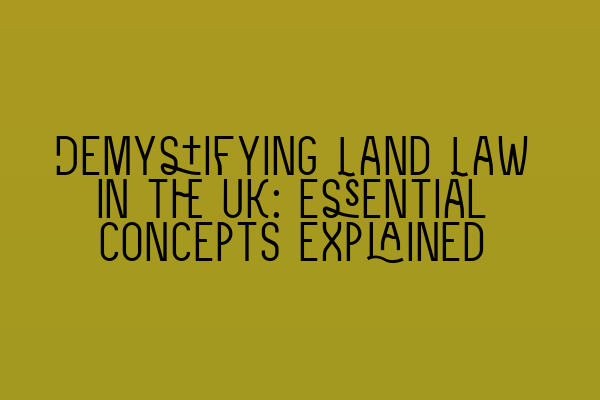Demystifying Land Law in the UK: Essential Concepts Explained
Welcome to SQE Property Law & Land Law! As leading solicitors in the field, we understand that navigating the complexities of land law can be overwhelming for many individuals. That’s why we’re here to demystify this area of law and provide you with an essential understanding of the key concepts involved. Whether you’re a first-time buyer, a property investor, or simply curious about land law, this blog post will serve as a comprehensive guide to help you unravel the legal jargon and navigate the intricacies of property ownership in the UK.
Title Tags: Land Law in the UK, Essential Concepts Explained, Demystifying Land Law
Introduction
1. Land Ownership and Property Types
In the UK, land ownership can take various forms. Freehold ownership grants an individual complete control and ownership of the land and any structures upon it indefinitely. Leasehold ownership, on the other hand, involves the granting of limited rights to the occupier for a fixed period of time. Moreover, it’s important to understand different property types, such as residential, commercial, and agricultural, as each carries its own set of legal considerations.
Keyword: Land Ownership, Property Types
2. Legal Estate vs. Equitable Interests
When discussing land law, the terms “legal estate” and “equitable interest” often arise. A legal estate refers to the bundle of rights and interests that a person holds in land, whereas an equitable interest represents a right that is enforceable in equity but not directly recognized by the law. Understanding the distinction between the two is crucial in determining the extent of one’s rights and obligations in relation to a property.
Keyword: Legal Estate, Equitable Interest
3. Registered and Unregistered Land
In the UK, land can be either registered or unregistered. Registered land is documented in the Land Registry, providing a system of reliable records of all registered properties. This simplifies the process of land transactions and offers increased legal certainty. Unregistered land, however, lacks formal documentation and requires additional steps to prove valid ownership. It’s essential to understand the implications of both registered and unregistered land when engaging in property transactions.
Keyword: Registered Land, Unregistered Land, Land Registry
4. Easements and Covenants
Easements and covenants are legal rights and restrictions that often accompany land ownership. Easements refer to the right to use or access another person’s land, such as a right of way. Covenants, on the other hand, are promises made by the landowner, which may impose certain obligations or restrictions on the use of the land. It’s important to be aware of the existence and implications of easements and covenants when purchasing or developing a property.
Keyword: Easements, Covenants, Right of Way
5. Mortgages and Charges
For many individuals, financing the purchase or development of a property involves taking out a mortgage or charge. A mortgage is a loan secured against the property, with the property serving as collateral until the loan is repaid. Charges, on the other hand, are created to secure the repayment of a debt or other financial obligation. Understanding the terms and implications of mortgages and charges is essential to avoid potential legal issues in the future.
Keyword: Mortgages, Charges, Property Financing
Conclusion
Land law in the UK can be complex, but with a firm grasp of the essential concepts discussed in this blog post, you’ll be better equipped to navigate property transactions and protect your interests. At SQE Property Law & Land Law, we’re here to provide you with expert legal advice and support to ensure smooth and successful property dealings. Should you require further guidance or assistance, please don’t hesitate to contact us. Happy property exploring!
Call-to-Action: Contact SQE Property Law & Land Law for Expert Legal Advice in Land Law Matters.
Keyword: Land Law, Property Transactions, Expert Legal Advice
